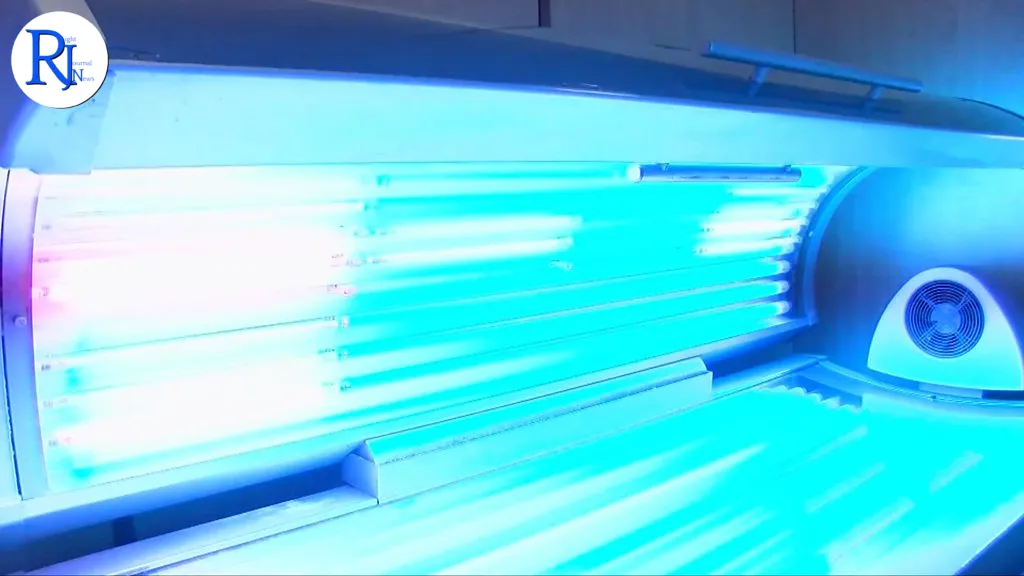Health experts are calling for a ban on commercial sunbeds in the UK, citing significant health risks associated with their use. Published in The BMJ, the report highlights the dangers of ultraviolet (UV) exposure from sunbeds, which can lead to skin cancer and other health issues. Prominent voices in the medical community, including dermatologists and public health officials, are advocating for legislative measures to eliminate these tanning devices from the market.
The call to action comes as awareness of the harmful effects of artificial tanning grows. With skin cancer rates rising, experts argue that the risks outweigh any perceived benefits of sunbed use. The report emphasises the need for the UK government to prioritise public health by implementing a ban similar to those already in place in countries like Brazil and Australia.

Image Courtesy of BBC
The Timing and Location of the Call for Action
The push for a ban was made public on 1 October 2025, with the publication of the report in The BMJ. The timing coincides with increasing scrutiny of sunbed regulations in the UK, as health officials aim to curb the rising incidence of skin cancer. The call for a ban is particularly pertinent given the UK’s climate, where limited natural sunlight drives some individuals to seek artificial tanning solutions.
The UK has previously implemented measures to regulate sunbed use, such as prohibiting their use by individuals under 18. However, experts argue these measures fall short of adequately protecting public health. The report suggests that only a complete ban can effectively reduce the health risks associated with sunbed use.
Health Risks Associated with Sunbed Use
Sunbeds emit UV radiation, which is a known carcinogen. Prolonged exposure to UV rays can cause significant skin damage, leading to premature ageing and an increased risk of skin cancers, including melanoma. According to Cancer Research UK, melanoma incidence rates have increased by 135% since the early 1990s, correlating with the popularity of sunbeds.
Dr. Helen Smith, a leading dermatologist, stated, “The evidence is clear: sunbeds significantly increase the risk of skin cancer. We are urging the government to take decisive action to protect public health by banning these dangerous devices.” The report also points to studies showing that individuals who use sunbeds before the age of 35 increase their risk of developing melanoma by 59%.
Comparative International Bans
Countries like Brazil and Australia have already taken steps to ban commercial sunbeds, setting a precedent for the UK. These countries have seen positive health outcomes following the bans, including a reduction in skin cancer rates. The UK’s medical community hopes to replicate these results by advocating for similar legislation.
In Brazil, the ban on sunbeds has been in place since 2009, while Australia followed suit in 2015. Both countries reported a decrease in the incidence of skin cancer, demonstrating the effectiveness of such measures. Experts believe that a UK ban could lead to similar public health benefits, reducing the burden of skin cancer on the National Health Service (NHS).
Public Perception and Industry Opposition
While health experts strongly support the ban, the sunbed industry argues that responsible use can mitigate risks. Industry representatives claim that sunbeds provide a controlled environment for tanning, which some consumers prefer over natural sunlight. However, public health officials maintain that the risks associated with any level of UV exposure from sunbeds are too significant to ignore.
Recent surveys indicate that public opinion may be shifting towards a more cautious approach to sunbed use. Increasing awareness of skin cancer risks and high-profile campaigns by health organisations have contributed to changing attitudes. Many individuals now opt for safer alternatives, such as spray tans or self-tanning lotions, which do not carry the same health risks as UV exposure.
Looking Ahead: Potential Impacts and Policy Changes
As the debate continues, the potential impact of a sunbed ban in the UK remains a topic of interest. Health experts predict that such a ban could lead to a significant reduction in skin cancer cases, ultimately easing the strain on healthcare resources. Additionally, a ban could promote healthier lifestyle choices and increase awareness of the dangers of UV exposure.
The UK government is expected to review the recommendations outlined in The BMJ report and consider their implications for public health policy. While no immediate legislative action has been announced, the growing body of evidence supporting a ban may influence future policy decisions. As public health campaigns and expert advocacy gain momentum, the possibility of a sunbed ban in the UK appears increasingly likely.

